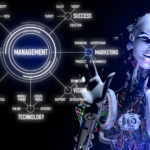Artificial Intelligence (AI) is not just revolutionizing industries; it’s also reshaping the landscape of governance and public administration. From optimizing service delivery to enhancing decision-making processes, AI holds the potential to transform the public sector in profound ways. Below we look out into the trajectory of AI in the public sector, exploring how and where it’s heading.

- Streamlining Service Delivery: One of the primary areas where AI is making an impact in the public sector is in streamlining service delivery. Government agencies are leveraging AI-powered chatbots and virtual assistants to enhance citizen engagement and provide round-the-clock support for inquiries and service requests. These AI-driven solutions help alleviate the burden on human staff while improving the efficiency and accessibility of public services.
- Enhancing Data Analytics and Insights: Data is the lifeblood of effective governance, and AI is revolutionizing how governments harness and analyze data to derive actionable insights. AI algorithms can process vast amounts of data from disparate sources, identifying trends, patterns, and correlations that inform evidence-based decision-making. From predictive analytics for resource allocation to sentiment analysis for public opinion monitoring, AI empowers policymakers with the insights needed to address complex societal challenges.
- Improving Public Safety and Security: In the realm of public safety and security, AI technologies play a pivotal role in enhancing situational awareness and threat detection. AI-powered surveillance systems can analyze video feeds in real-time, identifying suspicious activities and alerting law enforcement agencies to potential threats. Additionally, AI-driven predictive policing models help allocate resources more effectively, reducing crime rates and improving community safety.
- Optimizing Resource Allocation: Resource allocation is a perennial challenge for governments, and AI offers solutions to optimize the allocation of limited resources across diverse sectors. AI-driven optimization algorithms can analyze data on budgetary allocations, population demographics, and service demand to inform resource allocation decisions. Whether it’s healthcare funding, infrastructure investments, or social welfare programs, AI enables governments to allocate resources more efficiently and equitably.
- Addressing Societal Challenges: AI has the potential to address some of the most pressing societal challenges facing governments today, from healthcare disparities to climate change mitigation. In healthcare, AI-powered diagnostic tools improve patient outcomes by enabling early detection of diseases and personalized treatment recommendations. In environmental management, AI algorithms analyze satellite imagery and sensor data to monitor ecosystem health and inform conservation efforts.
- Ensuring Ethical and Responsible AI Use: As AI continues to permeate the public sector, ensuring ethical and responsible AI use becomes paramount. Governments must establish clear guidelines and regulations governing the development and deployment of AI technologies to safeguard against bias, discrimination, and privacy violations. Transparency, accountability, and stakeholder engagement are essential pillars of ethical AI governance, fostering trust and confidence in AI-driven public services.

In the future of artificial intelligence in the public sector is one of promise and possibility. From streamlining service delivery to enhancing decision-making processes and addressing societal challenges, AI holds the potential to usher in a new era of governance and public administration. However, realizing this potential requires proactive investment in AI research, infrastructure, and talent development, coupled with a steadfast commitment to ethical and responsible AI use. As governments navigate the complexities of AI adoption, they must prioritize inclusivity, transparency, and public trust to ensure that AI serves the collective good and advances the well-being of society as a whole.
you can also read our other articles for knowing more about artificial intelligence , it will help you to know how AI is increasing it;s importance in all the other sectors of the world. You can also make use of it in your day-to-day life.





